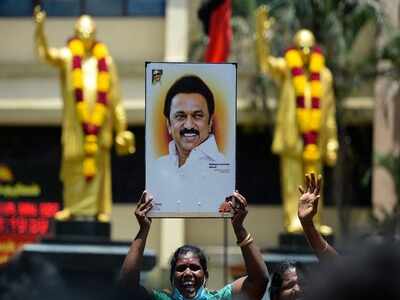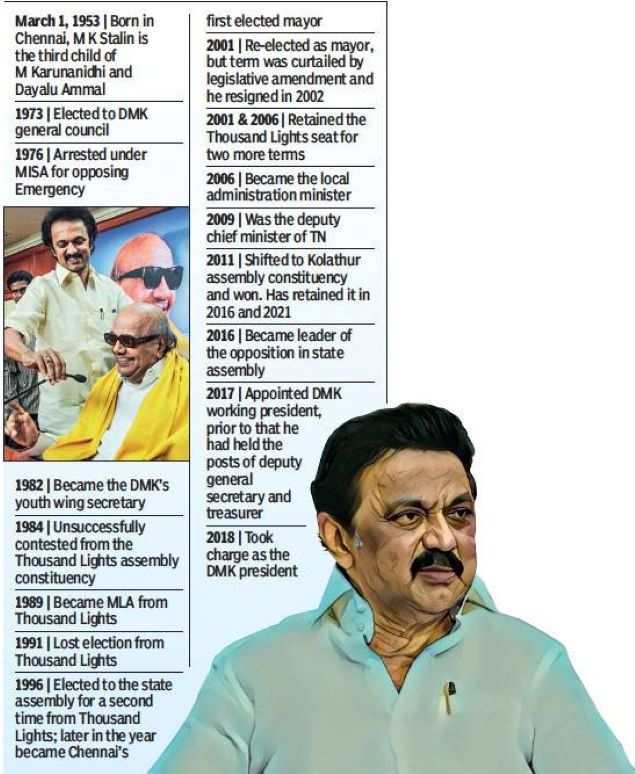Top Searches
- News
- City News
- chennai News
- M K Stalin: Finally, the prince becomes the king
M K Stalin: Finally, the prince becomes the king

A DMK supporter in Chennai
CHENNAI: Soon after the single-phase polling in Tamil Nadu on April 6, DMK president M K Stalin told people to follow precautions against Covid-19, wrote a letter to Prime Minister Narendra Modi demanding universal vaccination, and announced there would be no lockdown in Tamil Nadu after May 2 (counting day). He was already behaving like a chief minister.
Some said Stalin was in a hurry, but it also showed his confidence and sense of urgency. “He told party leaders he had made so many promises, he had to start working immediately to deliver on them,” says senior DMK leader T K S Elangovan.

Amid allegations of dynasty politics, DMK strategists made a conscious effort to put Stalin at the centre of its campaign. “His name has never resonated so much as it did in the past six months,”
says DMK’s political strategist Prashant Kishor. “Earlier, he was ‘Kalaignar’s son’, ‘former mayor’… now he was just Stalin, the person, the leader.”
Stalin’s wait has been so long that many saw him as the ‘perennial prince who couldn’t be king’. Being Karunanidhi’s son helped him climb the ladder, but climb he had to be step by step — as DMK general council member in 1973, political prisoner during the 1975 Emergency, DMK youth wing leader in 1982, Chennai mayor in 1996 and 2002, party deputy general secretary in 2003, local administration minister in 2006, and deputy chief minister in 2009.
The final step, however, was hard to take. During the run-up to the 2016 assembly polls, Stalin was unofficially projected as the chief minister candidate, but when the going got tough, Karunanidhi, then 92, said he would indeed take the top post. Even after Karunanidhi became bed-ridden in 2017, Stalin was made only the acting president; he was elected party president after Karunanidhi’s death in August 2018.
The inheritor now bears the burden of expectation. “It is unfair that Stalin is always compared to his father,” says Elangovan. “Besides being a national political colossus, Karunanidhi was a great orator and writer, which Stalin is not. But he makes up for it with his hard work.”
Ashok Vardhan Shetty, who worked as the municipal administration secretary under Stalin, concurs. “Stalin has the stamina. He works long hours and tours the state extensively,” says Shetty. “He is also courteous and listens to officials.”
A consultant who worked with Stalin says the problem is that he listens to too many people, adding to his indecisiveness. “A chief minister has to take a snap decision at times. Stalin can be wavering,” he says. This, multiple bureaucrats confirmed, would be Stalin’s biggest challenge. “Who he chooses as advisers will be crucial,” said a retired official who worked closely with Stalin.
Stalin had made a mark as Chennai mayor twice (from 1996 to 2001 and from 2001 to 2002), but his final graduation as an administrator was during 2006 and 2011, when he was the local administration minister for the first three years and deputy chief minister for the last two. Officials who worked with Stalin say he sees the bigger picture and does not try to micromanage. This, in fact, gave him an image of being a not-so-hands-on administrator.
Veterans who worked with Karunanidhi say the father kept a distant eye on Stalin by assigning smart officers as Stalin’s advisers, but did not make him dependent. “I’ve not heard once Stalin saying he would get back after consulting his dad,” says Shetty. “He took his own decisions, though he must have taken his father’s advice at home.”
People who move closely with Stalin say he cares deeply for his family, but doesn’t allow that to come between him and work. A former bureaucrat remembers an incident when a distant relative of Stalin refused to report to work after he was transferred to another district. The man threw Stalin’s name at his seniors and the matter went up to the highest level. An uncompromising official suspended the man who then approached Stalin through a relative. Stalin inquired with the officer and realising that the punishment was deserving, refused to interfere.
On the political front, Stalin has so far carried the mantle effectively. He has neutralised irritants like his elder brother M K Alagiri and revamped the party district units to ensure that functionaries are as loyal to him as they are efficient. Having established a rapport with Rahul Gandhi, he has been strident in his stance against the BJP, though it may be less out of conviction and more because of reading the political pulse better.
Stalin’s coronation raises different challenges to his rivals within the state and outside. While the AIADMK will now have to get back to its internal battles (between factions and with Sasikala) to remain relevant, the party’s regional allies will have to fend for themselves. The BJP will face the twin challenge of rethinking its southern strategy and guarding itself against an anti-saffron axis that just got strengthened with the victories of Stalin in Tamil Nadu and Mamata Banerjee in Bengal.
Besides being a national political colossus, Karunanidhi was a great orator and writer, which Stalin is not. But he makes up for it with his hard work
T K S Elangovan | Senior DMK leader
Some said Stalin was in a hurry, but it also showed his confidence and sense of urgency. “He told party leaders he had made so many promises, he had to start working immediately to deliver on them,” says senior DMK leader T K S Elangovan.

Amid allegations of dynasty politics, DMK strategists made a conscious effort to put Stalin at the centre of its campaign. “His name has never resonated so much as it did in the past six months,”
says DMK’s political strategist Prashant Kishor. “Earlier, he was ‘Kalaignar’s son’, ‘former mayor’… now he was just Stalin, the person, the leader.”
Stalin’s wait has been so long that many saw him as the ‘perennial prince who couldn’t be king’. Being Karunanidhi’s son helped him climb the ladder, but climb he had to be step by step — as DMK general council member in 1973, political prisoner during the 1975 Emergency, DMK youth wing leader in 1982, Chennai mayor in 1996 and 2002, party deputy general secretary in 2003, local administration minister in 2006, and deputy chief minister in 2009.
The final step, however, was hard to take. During the run-up to the 2016 assembly polls, Stalin was unofficially projected as the chief minister candidate, but when the going got tough, Karunanidhi, then 92, said he would indeed take the top post. Even after Karunanidhi became bed-ridden in 2017, Stalin was made only the acting president; he was elected party president after Karunanidhi’s death in August 2018.
The inheritor now bears the burden of expectation. “It is unfair that Stalin is always compared to his father,” says Elangovan. “Besides being a national political colossus, Karunanidhi was a great orator and writer, which Stalin is not. But he makes up for it with his hard work.”
Ashok Vardhan Shetty, who worked as the municipal administration secretary under Stalin, concurs. “Stalin has the stamina. He works long hours and tours the state extensively,” says Shetty. “He is also courteous and listens to officials.”
A consultant who worked with Stalin says the problem is that he listens to too many people, adding to his indecisiveness. “A chief minister has to take a snap decision at times. Stalin can be wavering,” he says. This, multiple bureaucrats confirmed, would be Stalin’s biggest challenge. “Who he chooses as advisers will be crucial,” said a retired official who worked closely with Stalin.
Stalin had made a mark as Chennai mayor twice (from 1996 to 2001 and from 2001 to 2002), but his final graduation as an administrator was during 2006 and 2011, when he was the local administration minister for the first three years and deputy chief minister for the last two. Officials who worked with Stalin say he sees the bigger picture and does not try to micromanage. This, in fact, gave him an image of being a not-so-hands-on administrator.
Veterans who worked with Karunanidhi say the father kept a distant eye on Stalin by assigning smart officers as Stalin’s advisers, but did not make him dependent. “I’ve not heard once Stalin saying he would get back after consulting his dad,” says Shetty. “He took his own decisions, though he must have taken his father’s advice at home.”
People who move closely with Stalin say he cares deeply for his family, but doesn’t allow that to come between him and work. A former bureaucrat remembers an incident when a distant relative of Stalin refused to report to work after he was transferred to another district. The man threw Stalin’s name at his seniors and the matter went up to the highest level. An uncompromising official suspended the man who then approached Stalin through a relative. Stalin inquired with the officer and realising that the punishment was deserving, refused to interfere.
On the political front, Stalin has so far carried the mantle effectively. He has neutralised irritants like his elder brother M K Alagiri and revamped the party district units to ensure that functionaries are as loyal to him as they are efficient. Having established a rapport with Rahul Gandhi, he has been strident in his stance against the BJP, though it may be less out of conviction and more because of reading the political pulse better.
Stalin’s coronation raises different challenges to his rivals within the state and outside. While the AIADMK will now have to get back to its internal battles (between factions and with Sasikala) to remain relevant, the party’s regional allies will have to fend for themselves. The BJP will face the twin challenge of rethinking its southern strategy and guarding itself against an anti-saffron axis that just got strengthened with the victories of Stalin in Tamil Nadu and Mamata Banerjee in Bengal.
Besides being a national political colossus, Karunanidhi was a great orator and writer, which Stalin is not. But he makes up for it with his hard work
T K S Elangovan | Senior DMK leader
FacebookTwitterLinkedinEMail
end of article
Trending Topics
Top Stories Right Now
- indiaDon't want to demoralise HCs, they are key pillars of democracy: SC on EC plea
- indiaCovid surge: Centre unlikely to impose nationwide lockdown
- indiaLive: Uttar Pradesh extends 'corona curfew' till May 6
- indiaAs Congress fades, regional satraps provide real opposition
- cityKarnataka live: 24 die at govt hospital due to oxygen shortage